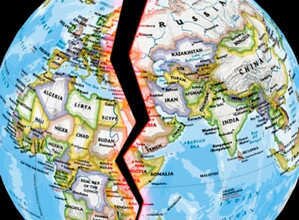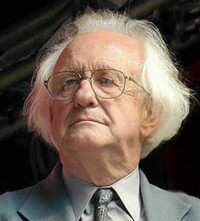
 Shlapko Maryana
Shlapko Maryana
5-year student of the Institute of Political Science and Law of the Drahomanov National Pedagogical University, speciality “Political Science”
“Not long ago Western man ruled the world,
now he studies it”.
(Dankwort A. Rustow)
The expansion of the globalization process and the actual break-up of the bipolar system give us reason to say that today there has been formed a multi-polar world order. However, the vast majority of scientists and leading experts tend to believe that the primacy in the global geopolitical arena belongs to the United States.
On the one hand, we can agree with this, because indeed, since the late 1980s the United States has been dominating in the economic and political spheres. Within a single century, under the influence of internal changes and dynamic international developments, the USA, a relatively isolated state, has turned into a world-scale state, into a truly progressive global state. On the other hand, on the geopolitical map of the world there appeared the players like the PRC, the EU, Russia, India, and Brazil and so on.
Here we see that the mono-polar world cannot exist for too long, as new centers of power emerge. At this, internationalization of the world economy makes the world more homogeneous, cosmopolitan, and creates both a severe reaction in the form of nationalism, separatism, thus emphasizing, civilizational and cultural differences between countries and regions.
 The Swedish political scientist Johan Galtung has put forward an interesting hypothesis about the “seven parallels of the mono-polar world space” having highlighted the seven centers that claim to global hegemony:
The Swedish political scientist Johan Galtung has put forward an interesting hypothesis about the “seven parallels of the mono-polar world space” having highlighted the seven centers that claim to global hegemony:
- The USA with hegemony in the Western hemisphere and in the Middle East and an attempt to be the hegemon of hegemons;
- The EU, which plays on the confrontation Russia-Turkey;
- Russia and the CIS, perhaps with the Orthodox Slavic states of Central Europe;
- Turkey with secular Muslim states;
- India and Hindu states;
- China — expanding influence as a result of the “hidden capitalism”;
- Japan, to which the economic leadership is not enough.
 Today the fight for leadership is becoming more serious. In its context, it is worth remembering about the “concept of geo-strategic agents and geopolitical centers” by Zbigniew Brzezinski's who believes that at this stage, only Eurasian geostrategic agents can compete with the United States for any reason — for the pursuit of national greatness, ideological self-realization, religious messianism, or economic growth — and change the existing geopolitical situation. Z. Brzezinski means here France, Germany, Russia, China and India. At the present stage of development of the geopolitical situation in the world, the above-mentioned countries gradually become strong enough to compete with the United States. One can't help quoting Dankwort A. Rustow: “Not long ago Western man ruled the world, now he studies it”.
Today the fight for leadership is becoming more serious. In its context, it is worth remembering about the “concept of geo-strategic agents and geopolitical centers” by Zbigniew Brzezinski's who believes that at this stage, only Eurasian geostrategic agents can compete with the United States for any reason — for the pursuit of national greatness, ideological self-realization, religious messianism, or economic growth — and change the existing geopolitical situation. Z. Brzezinski means here France, Germany, Russia, China and India. At the present stage of development of the geopolitical situation in the world, the above-mentioned countries gradually become strong enough to compete with the United States. One can't help quoting Dankwort A. Rustow: “Not long ago Western man ruled the world, now he studies it”.
 Key and dynamic geo-stategic agents in Europe, in my opinion, are Germany and France, whose main motivation is seen in the image of a united Europe. But they are not unanimous in their views of how closely such a Europe must be linked to the United States. At this, Germany's sphere of influence is spreading onto the Balkans and Central and Eastern Europe, and France's one — onto the Mediterranean.
Key and dynamic geo-stategic agents in Europe, in my opinion, are Germany and France, whose main motivation is seen in the image of a united Europe. But they are not unanimous in their views of how closely such a Europe must be linked to the United States. At this, Germany's sphere of influence is spreading onto the Balkans and Central and Eastern Europe, and France's one — onto the Mediterranean.
Despite its weakened statehood and economic problems, Russia also is known as a geostrategic agent. However, along with its most effective tool for implementing its foreign policy — energy factor — Russia is actively using the military potential as a means of pressure or aggression against other (including the former Soviet) countries. It has neo-imperial ambitions, which it formulates more and more bluntly, in particular in the form of the conflict unleashed against Ukraine. If you analyze the situation, you can conclude that this war will still take several years and will end in the Russian Federation's defeat. According to Cronus law, “All revolutions and wars always led to the destruction of those who started them”.
According to the World Bank's forecast, at the beginning of the 21st century China will become the most powerful economic pole. According to the Chinese themselves, the 21st century is the century of the Chinese civilization, which by its basic characteristics, especially the humanistic ones, has an advantage over other civilizations. And this ensures China's triumph in the third millennium. China has remarkable achievements in the military sphere. Today's China is a nuclear superpower with strong economic potential. In his time, Napoleon Bonaparte said of China: “Let China Sleep, for when the Dragon awakes, she will shake the world.” At this, China is a dynamic country with a planned economy and market mechanisms.
Today, China has become the most powerful financial and economic empire. It is mainly focused on itself. At first glance, its foreign policy is subject to its domestic one aimed at economic and social transformation of the country. At the same time, its foreign policy is oriented to the strategic time gain in order to achieve economic and military strengths, turning China into a powerful superpower. In the 21st century, China is a powerful country, already significantly influencing global geopolitics.
 One of the founders of geopolitics Karl Haushofer defined Japan as the “island country with a continental type of thinking”. Unlike another island country England, which has always sought to dissociate itself from Europe, at the same time contrasting itself to it, Japan, on the contrary, maintained close ties with Asia, especially with China, Korea, and owes the continent almost everything from writing to the tools and production. Japan's geopolitics still reflects peculiarities of its geographical location and political situation. The island location, overpopulation, lack of natural resources, — on the one hand, and on the other — a powerful, dynamically developing industry, an urgent need for raw materials and markets have formed Japan's desire to take a place in the world according to its potential. However, so far its political influence does not meet the available economic power.
One of the founders of geopolitics Karl Haushofer defined Japan as the “island country with a continental type of thinking”. Unlike another island country England, which has always sought to dissociate itself from Europe, at the same time contrasting itself to it, Japan, on the contrary, maintained close ties with Asia, especially with China, Korea, and owes the continent almost everything from writing to the tools and production. Japan's geopolitics still reflects peculiarities of its geographical location and political situation. The island location, overpopulation, lack of natural resources, — on the one hand, and on the other — a powerful, dynamically developing industry, an urgent need for raw materials and markets have formed Japan's desire to take a place in the world according to its potential. However, so far its political influence does not meet the available economic power.
Iran is eager to become a regional geopolitical in the Middle East. Thanks to the anti-Shah revolution of 1979, Iran gave impetus to the emergence of the phenomenon of “Islamic Renaissance”. This revolution has greatly influenced all the countries of the Islamic world.
Saudi Arabia and Iraq's role in the region is important too.
Saudi Arabia is the land of “black gold”, the birthplace of Islam, the country of Mecca and Medina. It occupies a special place not only in the Arab, Islamic world, but in general — in the international arena. In the second half of the 20th century, Saudi Arabia not only coped with the poverty of its population, illiteracy, diseases, but it achieved considerable success in its system of social protection, education, healthcare and sports. For decades, the country has been professing an important principle: “A Saudi is the engine of development; a Saudi is the ultimate goal of development”. Education traditionally has the main place in the policy of the government of Saudi Arabia. Caring for the poor, the disadvantaged is a constant political line of the Islamic state.
The West has for centuries existed at the expense of colonies and dominions; the latest forms of colonialism — financial and economic — are even more delicate, hard and inhuman. The disappearance in the early 1990s of the Second World greatly complicated the existence of the peoples of Africa and Latin America.
An important part of the world community is Africa. This “waking up continent” has faced a wide range of difficult geopolitical problems.
Most African countries do not support the concept of Westernization, that is, their orientation to social institutions, law standards of the West, particularly of the United States. At the same time, the idea of Africa's geopolitical gravity to Eurasia has not succeeded either. Africa has a reputation of the most conflict sphere of public life. This is due to a complex interplay of various conflictogenic factors: ethnic, clan, religious, socio-economic, political, etc.
African States today are characterized by a variety of political and socio-economic orientation. The types of economic relations — from the community to the patriarchal-capitalist and socialist ones — are entwined amazingly, sometimes just impressively.
The political system is dominated by various types of power: authoritarian military-dictatorial, one-party, multiparty, democratic and monarchist ones.
In the sphere of spiritual ideological life there is a wide variety of believes, from traditional African cultures and beliefs to Muslim and Christian religions, bourgeois and socialist ideas. At the end of the 20th century, in political terms, Africa was largely authoritarian regimes (in the mid-1990s, they prevailed in 38 out of the 45 states of the Tropical Africa).
A specific phenomenon of most African countries is the role of the army. The Army is a support and a lever of power in almost all African countries.
In geopolitical, regional tables of forces in Africa, the most important role, of course, is played by countries with powerful armies and impressive human potentials. They are Egypt, Morocco, Algeria, Ethiopia, Angola, and SAR.
Another specific factor of the African Continent, having great influence on its geopolitical condition, is inter-ethnic relations. African ethnic composition is colorful mosaic of nations, peoples, tribes: there are up to 50 nations and nationalities and 3 thousand tribes speaking thousands of languages on the continent.
Africa's fate is historically linked with the fate of the whole world. This continent was the cradle of humanity, having given powerful civilizations (Ancient Egypt, the Arab Caliphate, and others), but the colonial era significantly slowed down the development of its people having isolated them from global influence. Having got independence, each of the African countries chose its own way of development — capitalist or socialist — but, as life has shown, the Western and the Soviet model of development, which ignored the realities of the continent, had further deepened the economic crisis and had led to political and social instability, regional and ethnic confrontations, and had caused hunger, poverty and armed conflicts. In geostrategic terms, Africa gravitates to the West, although the process is complex, dynamic and contradictory. The geopolitical position of Africa, its position in the system of international relations largely depend on a radical change in the economic order in favor of formation of a more favorable environment for the continent. Until recently, this order was objectively directed against the interests of the peoples of Africa.
In the historical context, with the strengthening of economic, military, financial power and political weight of the United States, Latin America has been gradually drawn into the geopolitical field of the northern neighbor. And now, in the vast majority of countries of this continent, the USA occupy the position of the hegemon. The United States began “taking possession” of Latin-Americans in the first quarter of the 19th century. According to the Monroe Doctrine, in regard to the Latin America, “preference” was given to the United States, not the states of the Holy Alliance (Russia, Austria, Prussia). This actually affirmed the USA's hegemony in the southern hemisphere of the continent. That is, it was according to the Monroe Doctrine, that the United States began to act as an “international political force” to maintain internal order in Latin American countries.
At this stage, Latin American countries are facing the danger of marginalization in the world of emerging new geopolitical centers. The leaders of the countries on the continent have concluded that there is a need for a common Latin American front against the USA's hegemonic aspirations.
In the new geopolitical space, there is a number of new independent states, which at one time belonged to the area of land power. Ukraine is one of them. In the world hierarchy of countries it is, so to speak, in the second tier as the average by human development index state, which is equally far from being the richest and most powerful country and from being the poorest on the planet. From the point of view of classical geopolitics, Ukraine's geostrategy is currently characterized by three major paradigms: Eurasian, Euro-Atlantic and the Black Sea ones, which is predetermined by the specifics of Ukraine's geopolitical coordinates.
At this stage of its development, Ukraine has failed to realize its strong potential to the full and to take its rightful place in the world. It has become a virtually unstable “gray zone” between the West (Europe) and the East, between the USA/NATO and Russia. At the same time, since independence, Ukraine has not just lost nuclear weapons, industry, population, control of its main economic assets, but eventually, its territories (rich oil and gas fields on the shelf of the Black Sea in the area of Zmiyinyi Island and the Autonomous Republic of the Crimea).
As we can see, geopolitical relations in the world are characterized by intensification of the struggle of all sorts of world and regional power centers (blocs, unions, temporary alliances), first of all for spheres of influence. That is why geopolitical interests of the world's leading countries and regions have become the main driving force behind the current political processes. The radical change of the universe and of the geopolitical situation in the world is taking place against the background of growth of threats to security and manifestations of international terrorism. That is why, there is a need to resume the ideological and theoretical and methodological foundations of studying geopolitical interests as of an important factor of modern political processes.
Geopolitical relations in the modern world are developing at different levels: international, regional, national ones. However, the main is the global level, providing for analysis of the transformation of importance of geopolitical interests during the globalization of the modern political process. Today's geopolitical map of the world shows that the interests of each of the leading centers of influence do not match with political, economic, security and other spheres. And this provokes a confrontation between them at the global and regional levels and, consequently, — enhances the global instability, causes wars or armed conflicts. That is, each of these centers (alliances, blocs, unions, etc.) is trying to impose its own rules of the game and to become a hegemon on the geopolitical map of the world.
Therefore, today the following things are extremely important: institutional restructuring of the world and a search for the best form of control over development; more rigid stratification of states in economic and political spheres; transition of the system of the universe from a hierarchical to a bipolar or multipolar one, which complicates the problem of political leadership and legitimacy of the use of force. Considering in these circumstances the geopolitical structure of the future of the world, we should not leave out of sight the appearance of new and rather active subjects of international relations. As stated by Paul Goble: “The chessboard tipped and the pieces moved to other squares”.

